Although several large food corporations are reformulating their products to be more “natural”, there’s still a substance found in many conventional food items that isn’t suitable for human consumption – yet many people unknowingly eat it on a regular basis. It is in crackers, peanut butter, tortillas, chips, nuts, baked goods, fruit snacks, and it’s used at mainstream restaurants.
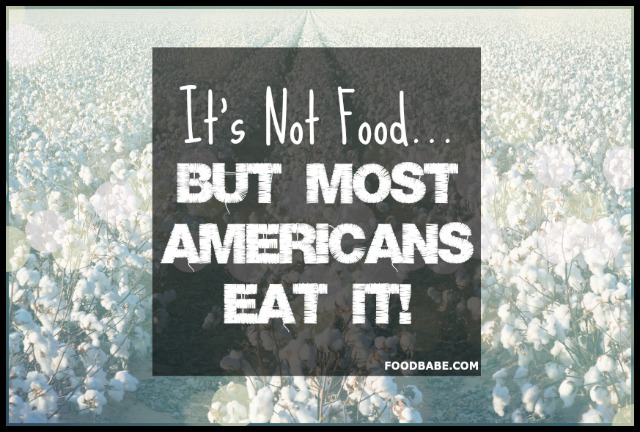
Cotton is not food.
It’s not a vegetable. It’s not a fruit. It’s not a grain. So, what is it?
Unless you’re on the dangerous cotton ball diet, we all know that cotton is not food! Cotton is a textile that’s used to make fabrics – yet the waste from this crop has been in our food supply for decades.
Cottonseed oil is made from a byproduct of the industrial waste from the cotton farming industry, which isn’t a food crop. Cotton crop waste is also used is to make some “cellulose” additives (when wood isn’t used) that’s added to products like Kraft shredded cheese. You’ll find these cotton byproducts in hundreds of mainstream processed foods because they’re cheap to produce and have a long shelf life. Cotton waste is also fed to conventional farm animals as a way to cheaply dispose of it and artificially bulk up their feed.
Would you bake with a candle wax?
We can thank Procter & Gamble for bringing cottonseed oil into the mainstream after they discovered that hydrogenated cottonseed oil makes a good candle wax and began marketing it as Crisco (whose name stands for “Crystallized Cotton Seed Oil”). To this day when I think of Crisco, I think of wax! But all kidding aside, the cotton industry isn’t something to joke about.
Cotton is known as the “World’s Dirtiest Crop”.
Not only is cotton one of the most prevalent genetically modified (GMO) crops (designed to produce an insecticide), cotton crops still require an intense application of agricultural chemicals. That’s why cotton has been called the “World’s Dirtiest Crop”, contaminating our groundwater and food supply with numerous pesticides that are classified as highly hazardous by the World Health Organization. Residues from these pesticides can remain in the cottonseed oil according to data collected by the FAO/WHO Joint Meetings on Pesticides Residues in Food. Further, to extract the oil the cottonseeds are subjected to intensive chemical refining with toxic hexane, bleach, and deodorizers.
GMO cotton farming is detrimental to the environment and has destroyed farmers lives.
Cotton farming also uses an extensive amount of water, and is responsible for drying up the world’s 4th largest lake. The newly dried up water basin is littered with chemicals: DDT, hexachlorocyclohexane, toxaphene, and phosalone (all known carcinogens) that have gone airborne and are poisoning the local population.
Almost all of the cotton in the world is grown in developing countries, where they have lower environmental standards and labeling regulations. In these poverty stricken countries that cotton is generally grown, child labor and inadequate safety standards are prevalent. Since 2002, thousands of Indian farmers committed suicide after the costly GMO seeds they used failed. There is nothing more insidious and despicable than an industry that preys upon the health, safety, and lives of innocent victims.
Cottonseed oil does not belong in our food supply and should be strictly avoided.
GMO BT cotton is not a savior for farmers – not only do they have to buy new seeds every year from Monsanto, but they don’t protect against all pests even though the seeds have built in insecticide – which means they end up spraying more pesticides! I’ve seen first hand the differences between GMO cotton and organic cotton – how it’s grown, what it looks like and the little difference in yield. The impact on the soil was enough to convince me that we must use regenerative organic farming if we are going to save our land and our bodies – especially since this toxic cotton is ending up in our food.
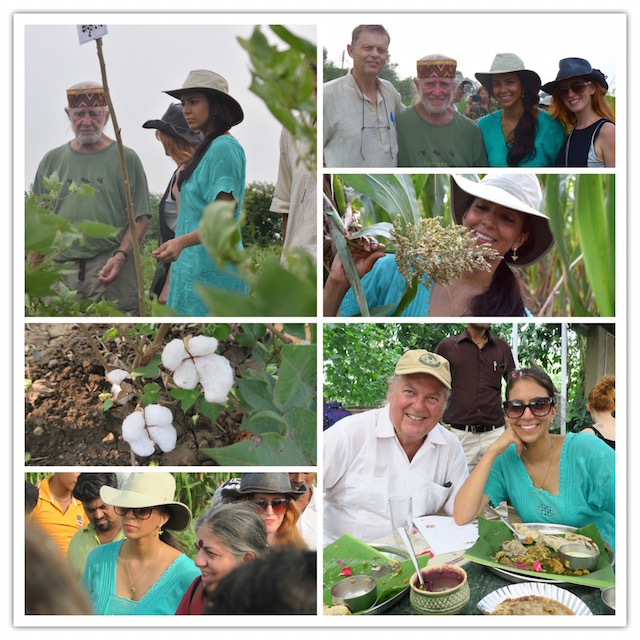
India Cotton Farm Pilgrimage & Regenerative Agriculture Tour in October 2015 with Dr. Vandana Shiva
Many brands and restaurants use cottonseed oil…
The list of brands that still use this substance is a mile long. I was a bit shocked when I contacted In & Out Burger and they told me they use cottonseed oil to fry their french fries – but they aren’t alone. Depending on location, Arby’s, Arctic Circle, Wendy’s, and Burger King sometimes use cottonseed oil in their fryers as well, which they use to cook anything fried like fries, chicken strips, and onion rings. According to Burger King’s latest ingredient list: “Products that are fried in a shared fryer include but may not be limited to: Fish Filet, Pork Sausage, Crispy Chicken patty, Chicken Nuggets, Original Chicken Patty, Spicy Chicken Patty, Hash browns, French Fries, French Toast Sticks, and Onion Rings. Fryer oil contains: corn, canola, soy and/or cottonseed oils”.
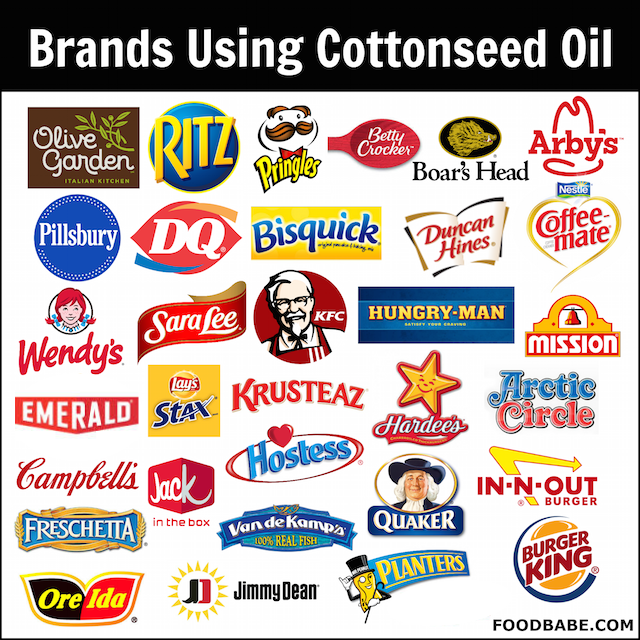
You’d never expect anyone to add it to beef, but Jack In the Box adds hydrogenated cottonseed oil to the beef in their 1/4 lb. “Signature” burgers – and it’s also in their homestyle potatoes and egg rolls. Burger King, Hardee’s, and KFC all use cottonseed oil in their biscuits (instead of real butter). Boar’s Head uses cottonseed oil to brown some versions of their deli meats. Hardee’s also uses it in their gravy, mashed potatoes, onion rings, croissants, and to cook their eggs. Dairy Queen uses cottonseed oil in some buns and their famous ice cream cones. You’ll find cottonseed oil in some Girl Scout cookies too.
Although they’re notorious for it, fast food restaurants aren’t the only restaurants guilty of cooking with cottonseed oil. When I was writing my book last year, I found out that Olive Garden uses cottonseed oil in their Alfredo sauce – (yuck)! Who knows what other mainstream “family” dining restaurants use cottonseed oil because most of them don’t publish or freely disclose their ingredients. Until restaurants are required to post their ingredients the only way to know is to ask them to read you the ingredients in their specific menu items and cooking oils.
We can make a change and it starts with each one of us.
Last week, I received this awesome email from Marilyn, a member of the Food Babe Army. This is a great example of something that all of us can do to make a change!
“Following is a email letter I sent to Publix about their use of cotton seed oil in MOST of their bakery items.
Dear Publix, I’ve been concerned for some time now about the cotton seed oil that is in almost all of Publix bakery item. I have eaten and enjoyed many of these items for years, even though I am a very health conscious person. I trusted that Publix with their squeaky clean reputation would not use ingredients known to be harmful or toxic. Then one day, I actually read the ingredients and saw cotton seed oil, then I read more items ingredients and found it was in almost everything. Then I went to Walmart and Winn Dixie, and read their bakery ingredients. I found they hardly use it all, which surprised me.
So, anyone who has an interest in using safer ingredients and has done a minimal amount of research knows that COTTON SEED OIL is the MOST chemical laden commercial or food grade oil on the planet. So many pesticides and herbicides and fungicides, etc have to be used on the crops because of all the issues in growing it. So why does the government even allow this toxic oil to be used in human food??? But Publix, of all the food chains, to be using this unhealthy cheap oil in all those delicious bakery items is soooo sad and disappointing. Publix usually holds such high standards, I am appalled.
So since I know that this letter will not get to who or where it will really matter, I am going to forward this and other concerns to “The Food Babe”, in hopes she will jump on this and use her army to influence Publix to omit this toxic ingredient. I know you know who the Food Babe is. Since she and her army of advocates, me being one of them, convinced Kraft to remove their artificial dyes from the macaroni and cheese products, she is quite influential. Please forward this email to the CEO of publix. PLEASE TAKE OUT THAT COTTON SEED OIL FROM THE BAKERY PRODUCTS, so we can go back to buying and enjoying them. I will never buy another bakery item from Publix until this toxin is removed. I have posted this all over facebook. Thank you Marilyn”
Go, Marilyn, Go! Here are some tips for sending a letter like this to your grocery store.
How to avoid cotton in your food:
- Continue checking the ingredient list on any packaged product you buy. We are very lucky here in the US, as food manufacturers are required to state whether they are using cotton or not. For example, in India and some other countries, they are not required to actually state which vegetable they are using for “vegetable oil.”
- When going out to eat, ask questions.
- If a restaurant won’t tell you what’s in their food, don’t eat it.
If you know someone who might be eating cottonseed – please share this post with them!
Xo,
Vani



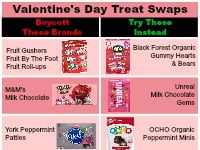
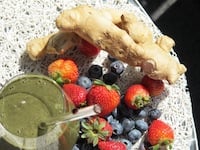
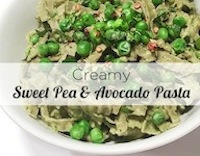


Just curious what you and your reader’s take is on hemp seed. Another example of a plant that has food and non food uses, it’s fibers are used for clothing and binding material in construction products but it’s seeds can be eaten or pressed for oil that is used as an ingredient in soap and cosmetics or to cook food with or as an ingredient in food items. There are many other examples e.g. flax that yield both food and fiber.
The predominant use of cotton and it’s primary economic rational for producing is as a source of fiber, but isn’t it a bit arbitrary to say that disqualifies extracting oils from its seeds for food purposes?
I love Ritz crackers and found out they have cottonseed oil and can cause heart attacks and strokes also cottonseed oil is banned in Denmark Switzerland Austria Iceland and Norway! What can we do about this?
There was some good information about the origins of Agent Orange and the extent of Monsanto’s role in its formulation and production in some exchanges of comments. We’re those removed?
Ignore or delete this. I see that discussion is still there.
Geez people. You have worn me out just reading all your battering back and forth. I’m sure you haven’t won anybody to your side. I’ve had an auto immune disease most of my life(65). When I cut out processed foods my joints and muscles quit hurting mainly because inflammation was no longer present. If I eat it I pay for it and I do eat it occasionally. In the end, like everything in life , it is the changes in you that get peoples attention. They will change or not change but it is their choice. So I read labels and choose and if enough people make wise choices then companies will have to change.
I love Ritz crackers and found out they have cottonseed oil and can cause heart attacks and strokes also cottonseed oil is banned in Denmark Switzerland Austria Iceland and Norway! What can we do about this?
We live in the United States what is wrong with the people here?!
Don’t understand the issue with cottonseed oil – hydrogenated CSO yes, hydrogenated oils aren’t good for you. CSO on the other hand is just an oil obtained from seeds like any other vegetable oil. No different to coconut, olive, sunflower or avocado oils.
Good report! Cottonseed oil is UNDER-REPORTED! It is actually an industrial type oil and what it is doing in food for consumption I have no idea???
What about Sweet Leaf Mint and Honey Green Tea
Your lack of understanding about vegetable oils is unbelievable for someone who call herself ‘the food babe’. Cotton is grown for the fiber but about 60% of what the plant produces is cottonseed, which is used as a human food and animal feed. Botanically the cotton plant, like soybean, is a fruit. Cottonseed oil was the first commercial vegetable oil sold in the US and has been a heart healthy, preferred oil since about 1910. Cotton Incorporated provided you with much technical information that I hope helped educate you. There are many book chapters and papers that address the human food and animal feed nutritional aspects of cottonseed. For example, see “M.K. Dowd and P.J. Wakelyn. 2010. Cottonseed: current and future utilization, Chapter 16, Cotton: Technology for the 21st Century, P.J. Wakelyn and M.R. Chaudhry, Eds. International Cotton Advisory Committee, Washington, DC,pp.437-460.” (book chapter). [this book is available on Amazon.com].
Thank you God someone with an IQ. Seriously people, you do understand they aren’t taking the fluffy white part that the plant grows….right? They are taking oil by pressing the seed same as any other legume oil.
I was asthmatic as a kid and as a result of skin tests, I was diagnosed as allergic to cottonseed by an allergist in the 1960s. I was around 10 years old at the time and food labels were not specific. They might include “oil” or “vegetable oil”, but not the specific kind. My pediatrician explained to my mother that it was in salad dressings and mayonnaise.
In the late 1970s, I ate some tortilla chips that were cooked in CSO and wheezed for a few hours, not a good idea to do this, but I had my proof that I was still allergic.
Recently, I had a cold virus that resulted in 2 weeks of coughing. I was taking Delsym for a few days until I realized it contains CSO. I was shocked to find this among the ingredients and immediately stopped taking it.
I don’t know anyone else who is allergic to CSO, but I appreciate your efforts to make people aware of the many foods containing CS-ingredients.
See my comment if you wish because I am allergic also.
Are you also allergic to cotton clothing?
I am highly intolerant to cottonseed oil. It has been proven back in 1939 – 1940, cottonseed oil was not a healthy oil. It is also cheap. FDA closes it’s eyes again.
I am allergic to cotton seed oil, especially in peanut butter, etc.
It puts me in a comprise like sleep.
I can eat peanut butter without this oil and be just fine.
My question… is it possible I am also allergic to 100% cotton clothing as well???
Cottonseed contains a photochemical that lowers fertility in humans.
Perhaps all the MSG and cottonseed is why so many people have so many problems with their endocrine systems.
I don’t eat fast food BECAUSE of the MSG load. Now I have another reason to avoid it. Yuck!